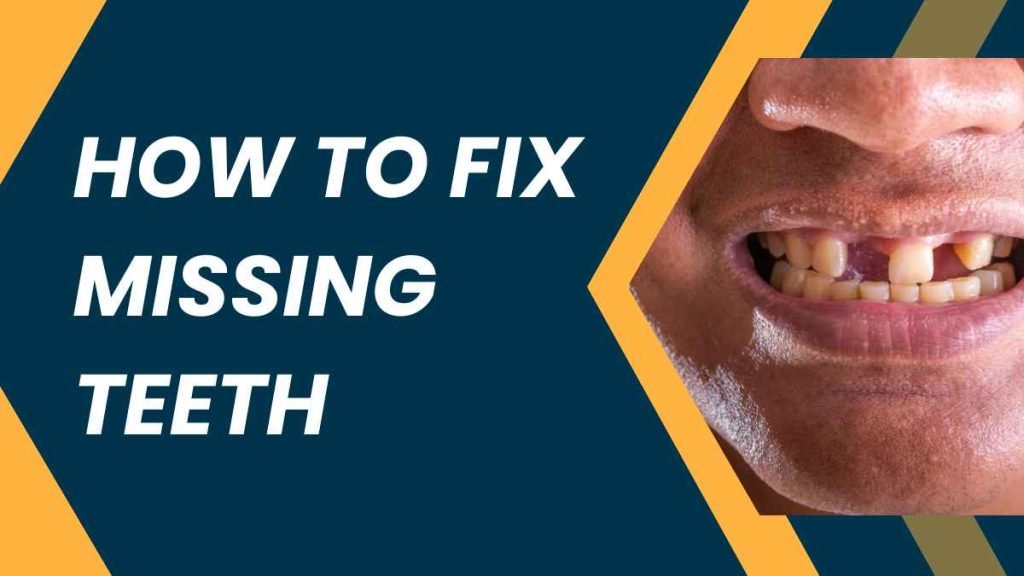How to Fix Missing Teeth! Missing teeth can be a source of discomfort and embarrassment, affecting not just your smile but also your overall oral health. Whether it’s due to decay, injury, or gum disease, dealing with missing teeth is essential for your confidence and well-being. In this comprehensive guide, we will explore How to Fix Missing Teeth. Here we’ll explore the causes of missing teeth, step-by-step methods to fix them, alternative solutions, the importance of addressing the issue, and the benefits of doing so.
Table of Contents
Causes of Missing Teeth
Understanding the root causes of missing teeth is crucial for effective treatment. Dental decay, gum disease, accidents, and genetic factors can all lead to tooth loss. Poor oral hygiene habits, like irregular brushing and flossing, can exacerbate these issues, making it vital to maintain good dental care practices.
How to Fix Missing Teeth: A Step-by-Step Guide
Here you can checkout the step-by-step guide about How to Fix Missing Teeth:
Total Time: 10 minutes
Dental Implants
Dental implants are a popular and permanent solution for missing teeth. In this procedure, a titanium post is surgically placed into the jawbone, acting as a root for the replacement tooth. This method provides a natural look and feel, restoring your smile and functionality.
Dentures
Dentures are removable prosthetic devices designed to replace missing teeth. They come in full or partial forms, offering flexibility based on your needs. Modern dentures are more comfortable and natural-looking than ever, providing an affordable solution for tooth loss.
Bridges
Dental bridges are fixed prosthetics that bridge the gap created by one or more missing teeth. They are anchored to adjacent teeth and can be made from various materials, ensuring a seamless fit and appearance.
Other Methods to Fix Missing Teeth
Dental Crown
Dental crowns are caps placed over damaged or decayed teeth. They not only restore the tooth’s appearance but also improve its strength and functionality. Crowns can be part of the solution for single missing teeth.
Removable Partial Dentures
Partial dentures are used when only some teeth are missing. They are convenient and removable, allowing you to maintain oral hygiene effectively.
Implant-Supported Dentures
Combining the stability of implants with the convenience of dentures, implant-supported dentures offer a secure and comfortable option for those missing multiple teeth.

Why It Is Necessary to Fix Missing Teeth
Missing teeth can lead to various issues if left untreated. These include difficulty chewing, changes in speech, and the shifting of remaining teeth. Additionally, it can impact your confidence, affecting social and professional interactions. Addressing missing teeth promptly is essential to prevent further oral health problems and enhance your quality of life.
Benefits of Fixing Missing Teeth
Improved Confidence: Replacing missing teeth restores your smile, boosting your confidence and self-esteem. You can smile, speak, and eat without worrying about gaps in your teeth.
Enhanced Oral Health: Filling the gaps prevents neighboring teeth from shifting, maintaining proper dental alignment. This contributes to better oral health and reduces the risk of gum disease and decay.
Better Chewing and Digestion: Missing teeth can make chewing difficult, affecting your digestion. Replacing them ensures you can enjoy your favorite foods without discomfort, promoting proper nutrition.
Common Mistakes to Avoid
When addressing missing teeth, avoid these common mistakes:
- Ignoring the Issue: Ignoring missing teeth can lead to more significant problems. Seek dental advice promptly.
- Neglecting Oral Hygiene: Even with replacements, maintaining good oral hygiene is crucial to prevent further tooth loss.
- Delaying Treatment: Delaying treatment can result in complications, making solutions more challenging and costly.
Tips and Tricks
- Regular Dental Check-ups: Schedule regular dental check-ups to detect and address issues early.
- Healthy Diet: Consume a balanced diet rich in calcium and vitamins to promote oral health.
- Quit Smoking: Smoking can worsen oral health issues. Quitting can improve the success of dental treatments.
Facts About Fixing Missing Teeth
- Success Rates: Dental implants boast a high success rate, making them a reliable choice for tooth replacement.
- Customization: Replacement teeth are customized to match your natural teeth, ensuring a seamless blend.
- Longevity: With proper care, dental implants and other replacements can last a lifetime, providing a long-term solution.
Conclusion
In conclusion of How to Fix Missing Teeth, addressing missing teeth is essential not only for your oral health but also for your confidence and overall well-being. By understanding the causes, available solutions, and the importance of timely treatment, you can make informed decisions about your dental care. Don’t let missing teeth hold you back—take the first step toward a healthier, happier smile today. Here you can checkout that How to Fix Discolored Teeth.
FAQs About How to Fix Missing Teeth
Are dental implants painful?
Dental implant procedures are typically done under local anesthesia, ensuring you won’t feel pain during the surgery. Mild discomfort afterward can be managed with prescribed medications.
How long does the dental implant process take?
The process can vary but generally takes a few months, allowing the implant to fuse with the jawbone. This ensures a stable foundation for the replacement tooth.
Can I eat normally with dental implants?
Yes, dental implants function like natural teeth, allowing you to eat your favorite foods without restrictions.
Are dentures uncomfortable to wear?
Modern dentures are designed for comfort. However, there might be an adjustment period initially. Regular dental visits can address any fitting issues.
Can missing teeth cause other health problems?
Yes, missing teeth can lead to issues like difficulty speaking and chewing, as well as jawbone deterioration. Addressing missing teeth promptly can prevent these complications.
How do I care for dental implants?
Dental implants require regular brushing and flossing, just like natural teeth. Regular dental check-ups are also crucial to monitor their condition.
Is everyone a candidate for dental implants?
While most people are eligible for dental implants, your overall health and bone density are factors considered. A consultation with a dentist can determine your candidacy.


